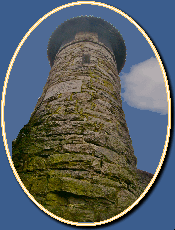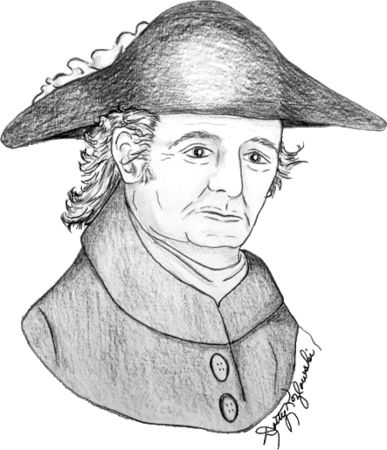Charles Pond (1744-1832) was the younger brother of Peter Pond (1740-1807) and part of a Milford family of nine children. While Peter was a rolling stone and ultimately distinguished himself in the Canadian fur trade, Charles stayed closer to home where he distinguished himself in the American Revolution, serving several times under George Washington.
Charles refused to learn a trade as his father desired, and at an early age went away to sea. At the age of 24 or 25 he fell in love with Martha, daughter of John and Martha Miles, who was three years older than he. Being a proud family, Martha’s parents objected to her union with a sailor without means, but finding them determined to marry gave their reluctant consent. After several voyages, he returned from the sea with a bag full of money. Carrying it to his wife he said, “Now, Patty, buy a house for yourself,” which she did.
In 1775, when the news of the Battle of Bunker Hill reached Milford, he was encouraged by his wife to enlist and march to Boston in aid of the colonists. He was commissioned an ensign in Capt. Peter Perit’s Company of Col. Charles Webb’s regiment, the "seventh line." On Sept. 14, 1775, the regiment was ordered by Washington to the Boston camp where it formed a portion of General Sullivan’s Brigade at Winter Hill. Pond remained there during the Siege of Boston.
In January 1776, Pond was promoted to First Lieutenant in the same company and regiment where Nathan Hale was a captain. In May 1776, Pond, known to be a skilled sailor, was detached for temporary service at sea. He took command of the sloop “Schuyler” at Norwalk. During that summer the “Schuyler” and sloop “Montgomery” cruised from Sandy Hook to Montauk Point. On June 19, Pond reported to Washington the capture off Fire Island of an English merchantman with a valuable cargo which Washington reported to Congress. A week later the “Shuyler” reported at Norwalk where it picked up Hale and landed him at Huntington, Long Island on the secret mission that resulted in his execution as a spy.
Pond was with Washington when he crossed the Delaware River on Dec. 25, 1776. He was at the Battle of White Plains and Battle of Princeton on Jan. 3, 1777. He received a captain’s commission later that January. Pond resigned his army command April 20, 1779 so he could take command of the war vessel, “New Defense,” that Connecticut was building for the defense of its coast. It later engaged a large English brig of war off the coast of Sandy Hook, New Jersey. The captain, officers and crew of the “New Defense” fought hard for more than an hour. But the sails and rigging were so cut by English rounds and grape shot that the little brig became unmanageable and was forced to surrender. A few days later, she arrived in New York where the captain and first lieutenant were soon exchanged. Until the end of the Revolution, Captain Charles Pond was part of the whale boat service in which whale boats, each armed with a small cannon, were used to harass Loyalist and English whale boats crossing Long Island Sound.
Capt. Pond’s wife, Martha, died of smallpox May 29, 1797, contracted after she had unpacked the trunk of one of her children who had the disease while on a visit. She had once planted a rose bush in their garden, and ever after when roses were in bloom, Pond carried a rose “picked from the bush that Patty planted.” Seeing the need of a caretaker for his eight children, he married Catherine DeWitt on Dec. 10, 1797. She has been described as small, unattractive, and of quarrelsome disposition. She proved a harsh stepmother and a thorn to Capt. Pond.
Pond represented Milford in the Legislature in 1780, ’88, ’89, ’90 to ’94 and 1800. When Orange separated from Milford in 1805, he was appointed by the Legislature as chairman of the town meeting held for that purpose. He is buried in Milford Cemetery where his headstone inscription encompasses his life well:
“In memory of Charles Pond who died May 18, 1832 aged 88.
He was a good Husband, a kind Parent, a pattern of Industry,
an actor in the Revolution and through life Liberty’s friend.”
When a Children of the American Revolution Society was being formed in Milford, organizers did not deliberate long in the choice of a patriot to honor. Thus on Oct. 23, 1922, the Captain Charles Pond Society was named in his honor.



